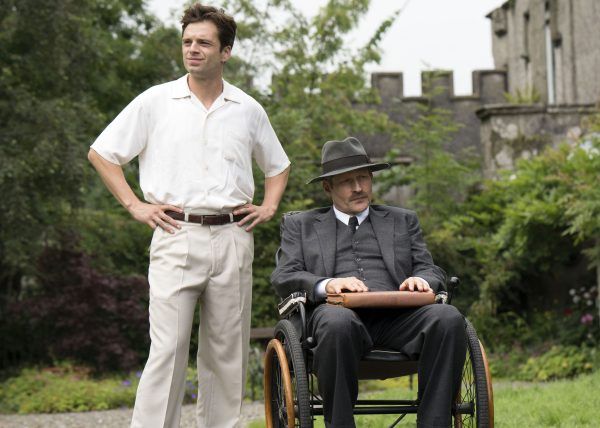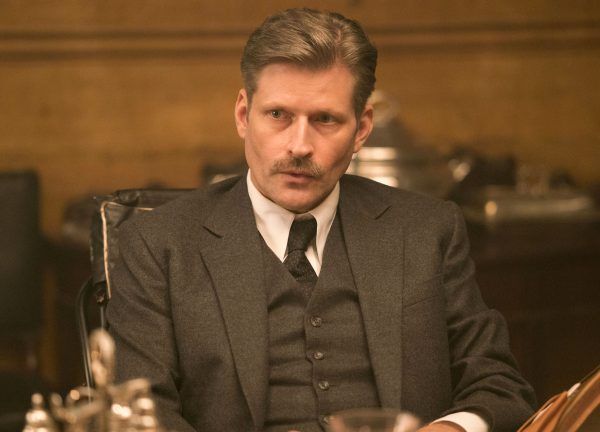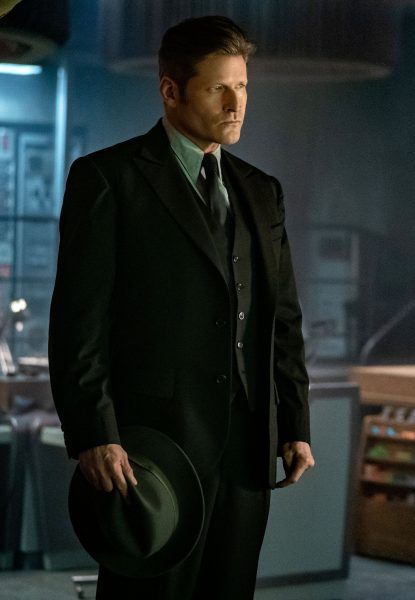From director Stacie Passon and adapted from the book of the same name by Shirley Jackson, the indie drama We Have Always Lived in the Castle tells the story of two sisters, Merricat (Taissa Farmiga) and Constance (Alexandra Daddario), who have isolated themselves after a family tragedy, in their large manor with their Uncle Julian (Crispin Glover). When Cousin Charles (Sebastian Stan) unexpectedly arrives, he disrupts their idyllic existence and threatens their family legacy.
During this 1-on-1 phone interview with Collider, actor Crispin Glover talked about what drew him to this story, why he found Uncle Julian to be such an interesting character, the archetype of this unusual man, finding the levels to play him in, and what it was like to work in a wheelchair. He also talked about working with director Stacie Passon again, on an episode of the second season of American Gods, what he’s enjoyed about the journey on the series, his experience working with adapted material, and why he loves collaborating with director David Lynch.
Collider: When this script came your way with an offer, and then you read it, what was your reaction to the material and this odd family?
CRISPIN GLOVER: I don’t always read a script, right from the beginning. I’ll just look at stuff, when I’m first looking at it, and it was just apparent, just from reading the pages, that this was literary-based and good material. It was obviously interesting, immediately.
What were the aspects of it that you really felt most drawn to?
GLOVER: Aside from the evident literary excellence that it derived from, the character archetype that I was offered was a different character archetype then I usually am offered. Not always, but I often play antagonistic characters. And when I say character archetype, I’m referring to Joseph Campbell’s book, Hero With A Thousand Faces, where he coined the term hero’s journey structure. There are archetypal characters that happen in stories, throughout the world and throughout time. The archetype of this character is unusually done, but it would fit into the mentor character, and that was something that I’d not played, previously. It sounds funny because, at the same time that I would say it fits into the mentor character archetype, the character specifically has some dementia, so the mentor having dementia is a funny thing. The whole novel tends toward operating in that fashion, where it’s mysterious, in many ways.
Uncle Julian is someone who occasionally has outbursts. How did you decide when you wanted to go bigger or smaller with him?
GLOVER: There were different versions of the screenplay. The screenplay did a change a bit, and the character changed, which even happened while we were shooting. There were a lot of discussions, and I’m pleased with the results. I’m very happy with how it came out. There were certain drafts of the script that had more outbursts and more of that disruptive aspect, which started to lead it away from the mentor archetype and started to turn it into an antagonist archetype, which is not what the initial draft that I read had. And then, we went back into the original novel, where the character really fits into that mentor character. So, it actually went even more to what the original novel was than even the earlier draft was, that I had first read. It was a good trajectory, how it came about.
You really feel for all three of these characters, emotionally, even though you’re not really sure what to make of any of them, initially.
GLOVER: Yeah. It’s a very interesting complexity. Even though there are archetypes that fit into what you can call the hero’s journey structure, [the book’s author] Shirley Jackson played with them in very interesting and unusual ways. It has true psychological depth and beauty because of that.
How did working in the wheelchair inform your performance? When you take away that level of the physicality, does it inform other aspects of what you’re doing?
GLOVER: Perhaps. It’s the second time that I’ve played a character in a wheelchair. I did a film that Robert De Niro and John Cusack are in, called The Bag Man, where I played a character that had more of an antagonistic aspect to it. It was a very different kind of character, but it was a character in a wheelchair, although there is a play on that, in the film. With this film, the wheelchair was apparent, so I did not really think about that too much. I just wanted to be familiar enough with the chair to be able to operate it properly.
Some of the most exciting moments to watch in this are the ones when you’re all in a scene together, talking about different things, at the same time. What were those scenes like to shoot?
GLOVER: There’s that one important scene, that’s more towards the end, where we’re all four of us are in the kitchen, and (director) Stacie [Passon] covered that well. We got a lot of different aspects, and she’ll ask for different interpretations, which I think is a good thing to do because you get different levels of performance. She’s good with that. And then, I think they edited it in a nice fashion, as well.
Your director on this film, Stacie Passon, also directed an episode of Season 2 of American Gods (Episode 204, called “The Greatest Story Ever Told”). How did that experience compare?
GLOVER: For me, both of the projects intertwined quite a bit. I shot the first episode of the first season of American Gods, and then I went away to Ireland to shoot We Have Always Lived In the Castle, and then I came back and shot the next episode of American Gods. And then, on the second season, Stacie was a director of one of the episodes. I’ve seen the list of authors that Neil Gaiman considers influences, or that are authors that he admires, and one of them is Shirley Jackson, which I can really see. Of course, both American Gods and We Have Always Lived In the Castle are beautiful books. They’re different from each other, but at the same time, there are similarities, just in the fact that they’re mysterious, you don’t necessarily know where they’re going, and they get into some deep psychology. There’s really interesting writing, in both of them. I do like the literary source material that can have genuine depth to it.
What have you most enjoyed about the journey that you’ve gotten to take on American Gods, playing Mr. World?
GLOVER: It’s a bit curious because there are differentiations from the book. There’s been different showrunners. The original showrunners had a certain idea, which went away from the book. Neil Gaiman is the executive producer, so the spine is there, no matter what. Really, what my philosophy with it has been is that, if Neil Gaiman is happy, then I’m happy. If he’s not happy, then I’m not happy because, ultimately, he wrote the book. If he’s okay with the interpretation, then great. That’s something that I always think about, when working on adaptations. I think about, is this true to what the author would want? There are so many different personalities and collaborations. With [Stanley] Kubrik, [Vladimir] Nabokov co-wrote the Lolita screenplay with him. But famously, Stephen King disliked the interpretation of The Shining, and Anthony Burgess had complex reactions [about A Clockwork Orange] because there was a 21st chapter that was not published in the United States, but was published in England. That chapter was important to him, but it was not utilized in Kubrik’s version of it. He felt that the 21st chapter had some reconciliation with the violence that Alex goes through. I can see why they got rid of it. I read Crime and Punishment years after I read A Clockwork Orange, and I could see the strong influence. The 21st chapter of A Clockwork Orange was an analog to the epilogue of Crime and Punishment, but Crime and Punishment’s epilogue, for me, is one of the most beautiful things that I’ve ever read, literary wise. I read the 21st chapter at a newsstand, when it was published in Rolling Stone magazine in the ‘80s, for the first time, and I preferred how they ended it in the film. I understand what Anthony Burgess was saying, but I’m certain that what Kubrik did for his film was correct. I actually do think it works better without the 21st chapter. Supposedly, Nabokov was happy with the film of Lolita, whereas Kubrik said, had he known the amount of censorship that he would’ve had to go through, he wouldn’t have even begun to make the film. Nabokov probably knew that he’d written a great novel, so what difference does it make, if there’s some other interpretation of it? It’s hard for me to know where Neil Gaiman sits. He doesn’t seem overly protective of the material, and yet, at the same time, I’m sure he does care. It’s interesting to be a part of it, that’s for certain.
One of your most memorable performances, for me, was in Wild At Heart. How did you find the experience of working with a filmmaker like David Lynch, who is much more of an overall artist than just a filmmaker?
GLOVER: He’s great. I love David Lynch. When I 16, I was in acting class, at the time that I saw Eraserhead, and that was very important movie to me then. I acted in two different productions of his, the first one being Wild At Heart, and then there was a pilot for a series, called Hotel Room, which I was in with Alicia Witt, and that only got through the pilot. The premise was that the hotel room would go through different time periods, with different characters, and the time period that I was in was the 1920s. Also, David Lynch agreed to executive produce what will end of being part three of my trilogy. I’ve directed part one and part two, and he was genuinely very helpful. I showed him a cut of part one, What Is It?, which was originally a short film to get backing for It Is Mine. I went to his house and showed it to him, and he was very nice and very supportive, but he didn’t say anything specific to me about it. I thought, “Well, I guess he doesn’t want to be an executive producer on this film.” And then, I found out that he’s talked about how he did executive produce the film, and had I know that, while I’d been touring with the film for 14 years, I would’ve been advertising that David Lynch had executive produced the film. Neither one of us are contract-oriented, so I did not know that he thought that, but he genuinely has been helpful with my filmmaking. He’s great. And he’s supposed to be the executive producer of It Is Mine, which is now part three of the trilogy. So, I have nothing but great things to say about David Lynch. He’s genuinely been very helpful to me.
We Have Always Lived in the Castle is in theaters and on VOD.




